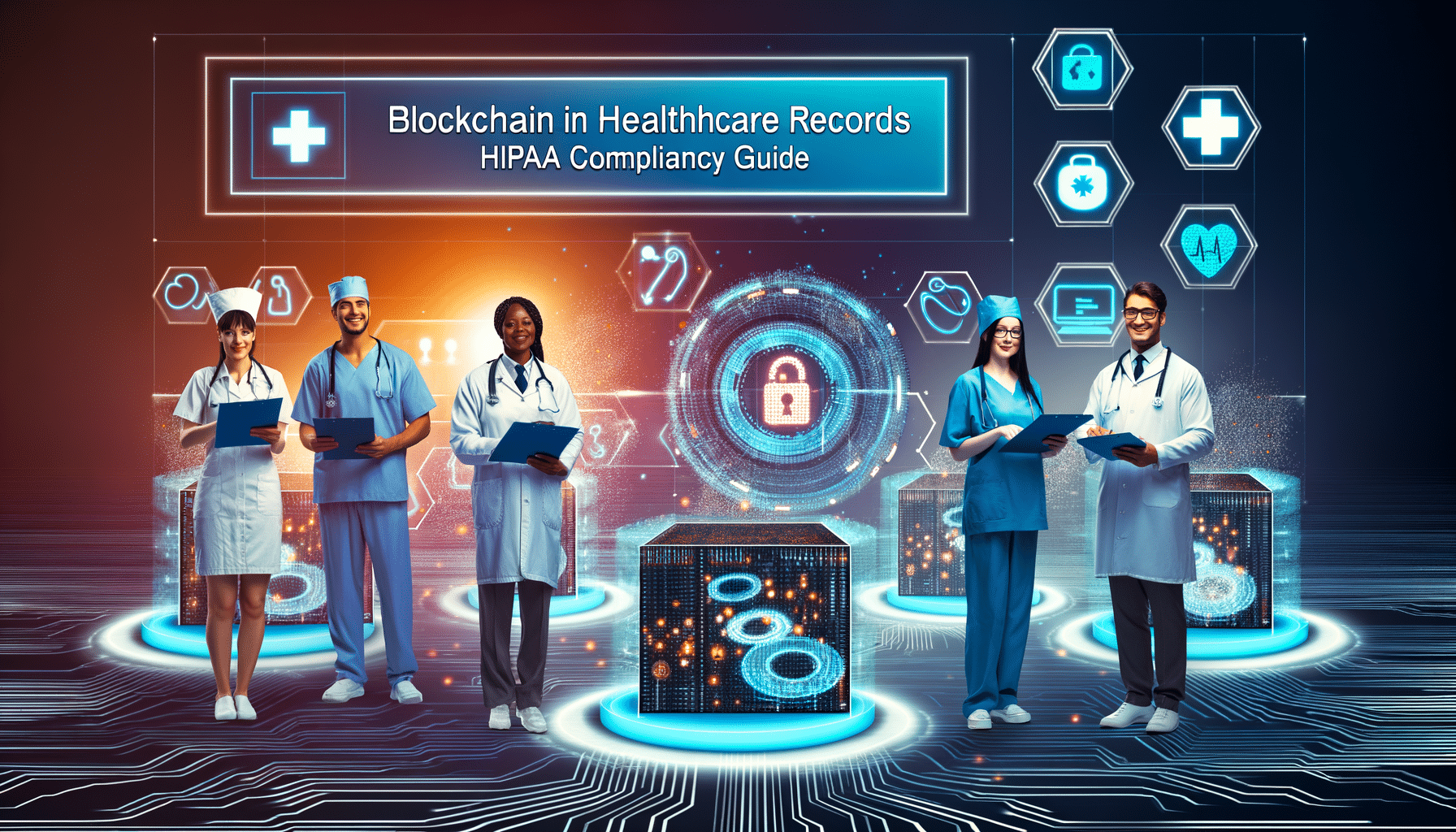- AI in Healthcare
- November 16, 2024
Blockchain in Healthcare Records: HIPAA Compliance Guide

In the rapidly evolving landscape of healthcare, data security and privacy remain paramount concerns. The advent of blockchain technology, coupled with the imperative of adhering to HIPAA compliance, offers a promising solution to these challenges. As I delve into the intricacies of integrating blockchain with healthcare records, the potential for revolutionizing industry standards becomes unequivocally clear.
The Intersection of Blockchain and Healthcare
Blockchain, a decentralized and tamper-proof ledger system, presents a unique advantage in managing healthcare data. Traditionally, healthcare records have been prone to breaches and inefficiencies due to centralized data systems. However, with blockchain, each data entry becomes an immutable part of the ledger, offering unparalleled security and traceability.
When blockchain technology is employed in healthcare, the benefits are multifaceted:
- Accuracy and Consistency: Blockchain ensures data remains consistent and accurate, reducing discrepancies that often arise in healthcare records.
- Enhanced Security: With cryptographic principles at its core, blockchain significantly mitigates the risk of unauthorized access.
- Transparency: Every alteration or addition to a record is transparent and traceable, fostering trust among stakeholders.
Understanding HIPAA Compliance in Blockchain
HIPAA, the Health Insurance Portability and Accountability Act, establishes stringent requirements for protecting sensitive patient information. To leverage healthcare blockchain effectively, understanding how to integrate HIPAA compliance becomes essential.
Smart Contracts and Access Control
One of the key features of blockchain that aligns with HIPAA compliance is the use of smart contracts. These programmable protocols can automate consent management and ensure that only authorized individuals gain access to sensitive data. By defining access controls within the smart contracts, organizations can enforce HIPAA’s privacy and security rules seamlessly.
Data Encryption and Anonymization
Blockchain technology facilitates the encryption and anonymization of patient data, crucial for maintaining confidentiality as prescribed by HIPAA. By encrypting data entries, blockchain keeps sensitive information secure, even if the network is breached. Furthermore, blockchain platforms can employ anonymization techniques to mask individual identities, bolstering privacy without compromising data utility.
Implementing Blockchain for HIPAA Compliance
Successfully integrating blockchain within healthcare requires a strategic approach, ensuring the technology complements HIPAA regulations:
- Thorough Assessment: Conduct a comprehensive evaluation of current data management processes and identify areas where blockchain can offer substantial improvements.
- Collaborative Strategy Development: Engage healthcare professionals and IT experts to design blockchain solutions that address specific compliance challenges while enhancing operational efficiency.
- Regulatory Alignment: Work closely with legal advisors to ensure that blockchain implementations adhere strictly to HIPAA guidelines, avoiding potential pitfalls.
- Ongoing Monitoring and Auditing: Establish mechanisms for continuous monitoring and auditing of blockchain systems to maintain compliance and security.
Success Stories and Leading Implementations
A number of pioneering healthcare organizations have already embraced blockchain technology with notable success. For instance, Medicalchain integrates blockchain to provide patients with greater control over their health data while facilitating secure data exchanges between medical institutions. Such applications not only highlight blockchain’s utility but also illustrate its potential to transform healthcare data management.
The Future of Healthcare Blockchain and HIPAA Compliance
As healthcare systems worldwide grapple with data management challenges, blockchain offers a powerful ally in ensuring HIPAA compliance. While the journey to integration may be intricate, the rewards of enhanced security, efficiency, and trust among patients and providers are invaluable.
Through careful planning and strategic implementation, healthcare providers can harness the capabilities of blockchain, transforming their approach to data security and compliance. For legal, finance, and compliance heads considering this technological shift, the value proposition is undeniable: a secure, transparent, and efficient method for managing healthcare records in an ever-evolving regulatory environment.
This guide sets the pathway towards a reimagined future where healthcare blockchain and HIPAA compliance coexist harmoniously, reflecting a new era of secure, patient-centric healthcare.
Stay tuned for more insights as I continue to explore the dynamic intersection of technology and healthcare, shedding light on innovative solutions that redefine our approach to record management.
Toshendra Sharma is the visionary founder and CEO of RecordsKeeper.AI, spearheading the fusion of AI and blockchain to redefine enterprise record management. With a groundbreaking approach to solving complex business challenges, Toshendra combines deep expertise in blockchain and artificial intelligence with an acute understanding of enterprise compliance and security needs.
Related Posts

Quick Filing Systems for Busy Clinics
Efficient filing methods for high-traffic medical offices.
- December 16, 2024

Handling Rush Requests for Medical Records
Managing urgent medical record requests efficiently.
- December 1, 2024
Archives
- January 2025
- December 2024
- November 2024
- October 2024
- September 2024
- August 2024
- July 2024
- June 2024
- May 2024
- April 2024
- March 2024
- February 2024
- January 2024
- December 2023
- November 2023
- October 2023
- September 2023
- August 2023
- July 2023
- June 2023
- May 2023
- April 2023
- March 2023
- February 2023
- January 2023
- December 2022
- November 2022
- October 2022
- September 2022
Want to get more content like this?
Signup to directly get this type of content to your inbox!!
Latest Post
Document Control for Equipment Maintenance
- January 20, 2025
Managing Records for Multiple Clients
- January 19, 2025
Handling Conference Documentation
- January 18, 2025
Setting Up Department Record Reviews
- January 17, 2025





